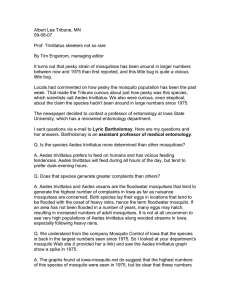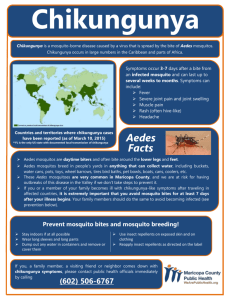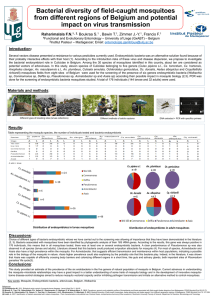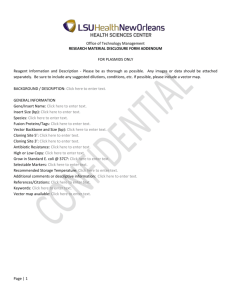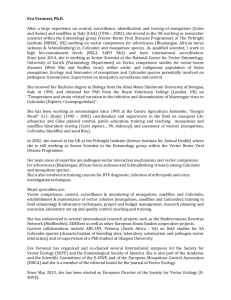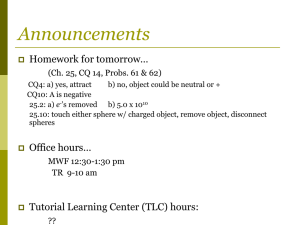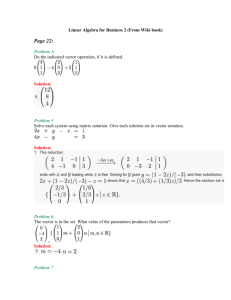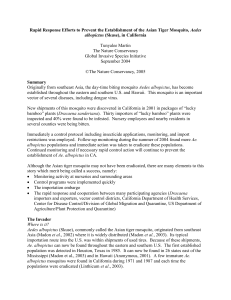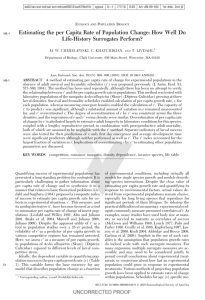Sunday 12th October 16.00 – 19.00 Participants registration Monday
advertisement
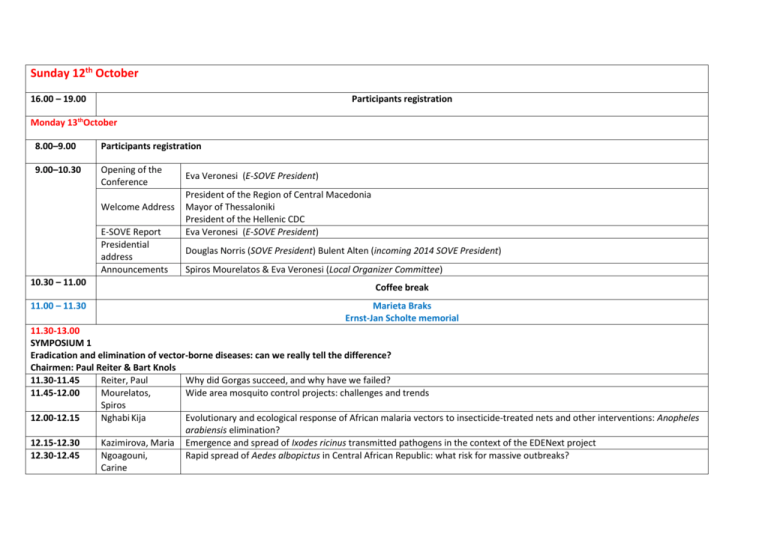
Sunday 12th October 16.00 – 19.00 Participants registration Monday 13thOctober 8.00–9.00 Participants registration 9.00–10.30 Opening of the Conference Welcome Address E-SOVE Report Presidential address Announcements 10.30 – 11.00 11.00 – 11.30 Eva Veronesi (E-SOVE President) President of the Region of Central Macedonia Mayor of Thessaloniki President of the Hellenic CDC Eva Veronesi (E-SOVE President) Douglas Norris (SOVE President) Bulent Alten (incoming 2014 SOVE President) Spiros Mourelatos & Eva Veronesi (Local Organizer Committee) Coffee break Marieta Braks Ernst-Jan Scholte memorial 11.30-13.00 SYMPOSIUM 1 Eradication and elimination of vector-borne diseases: can we really tell the difference? Chairmen: Paul Reiter & Bart Knols 11.30-11.45 Reiter, Paul Why did Gorgas succeed, and why have we failed? 11.45-12.00 Mourelatos, Wide area mosquito control projects: challenges and trends Spiros 12.00-12.15 Nghabi Kija Evolutionary and ecological response of African malaria vectors to insecticide-treated nets and other interventions: Anopheles arabiensis elimination? 12.15-12.30 Kazimirova, Maria Emergence and spread of Ixodes ricinus transmitted pathogens in the context of the EDENext project 12.30-12.45 Ngoagouni, Rapid spread of Aedes albopictus in Central African Republic: what risk for massive outbreaks? Carine 12.45-13.00 Mulligan, Steve 13.00-14.00 Invasion of Aedes aegypti into California, USA Lunch 14.00-15.15 SYMPOSIUM 2 Epidemiology of vector-borne diseases and Vector distribution Chairmen: Anna Papa & Veerle Versteirt 14.00-14.15 Versteirt, Veerle VectorNet : A European network for sharing data on the geographic distribution of arthropod vectors of human and animal disease agents 14.15-14.30 Algimantas Epidemiology of canine babesiosis and expansion of their vector Dermacentor. reticulates tick in Baltic Countries Paulauskas 14.30-14.45 Stilianakis, Environmental factors influencing the prevalence of Culex mosquitoes: An ERA-Interim approach. Nikolaos Prudhomme, Spatiotemporal dynamics of sandfly populations: a 3-year follow-up in the South of France. 14.45-15.00 Jorian Bellini, Romeo The West Nile virus integrated surveillance system in the Emilia-Romagna region: output and cost benefit evaluation 15.00–15.15 15.15-15.30 15.30-16.00 Coffee break Keynote lecture Bart Knols Changing the way we control malaria in Africa: Eave tubes 16.00-17.30 SYMPOSIUM 3 Risk assessment, modelling, remote sensing analysis, climate changes Chairmen: Marieta Braks & Andreas Rose 16.00-16.15 Paaijmans, Krijn Relevant microclimate for determining disease transmission risk 16.15-16.30 Cianci, Daniela Modelling the potential spatial distribution of mosquito species using VecmapTM 16.30-16.45 Erguler, Kamil The impacts of climate change on the Aedes albopictus populations across the globe: the modelling challenge 16.45-17.00 Dovas, Surveillance and early warning of West Nile virus lineage 2 using domestic pigeons and backyard chickens Chrysostomos 17.00-17.15 Silaghi, Cornelia Dermacentor reticulatus and Babesia canis: a field study on the occurrence in Bavaria with digital habitat analysis 17.15-17.30 Liebenberg, The effect of climatic variables on the distribution of African horse sickness in Namibia Danica 17.30-19.00 EMCA General meeting 20.00 –21.30 Welcome cocktail Tuesday, 14th October 8.30 – 9.00 Keynote lecture Jan Lundström Mosquito-borne infections and vector mosquitoes in northern Europe 09.00-10.30 SYMPOSIUM 4 Invasive vector species and new emerging vector-borne diseases: what’s next? Chairmen: Anna-Bella Failloux & Jolyon Medlock 09.00-09.15 Suter, Tobias Biology, surveillance and control of invasive mosquitoes in Switzerland 09.15-09.30 Failloux, AnnaChikungunya virus adapted for transmission in a temperate climate? Bella 09.30-09.45 Mosca, Andrea Evidences of mosquito-transmitted flavivirus circulation in Piedmont, North-Western Italy 09.45-10.00 Papa, Anna Detection of West Nile virus and insect- specific Flavivirus RNA in Culex mosquitoes, central Macedonia, Greece 10.00-10.15 Braks, Marieta From acaralogical risk to Lyme prevention: Avert, convert, alert! 10.15-10.30 Jacquet, Phylogeography of Culicoides imicola (Diptera: Ceratopogonidae), biting midge vector species of Orbivirus : expansion and Stephanie colonization ? 10.30–11.00 Coffee break 11.00-12.30 SYMPOSIUM 5 Genomics: towards better understanding on vector ecology and control Chairmen: Gregory Lanzaro & John Vontas 11.00-11.15 Vontas, John Molecular analysis of insecticide resistance in major mosquito vectors: from mechanisms to resistance management. 11.15-11.30 Radrova, Jana Trypanosomes of African great apes and their insect vectors 11.30-11.45 Lanzaro, A population genomics approach to understanding resistance to impregnated bed nets in African malaria Vectors. Gregory 11.45-12.00 De Waal, Tania Detection of African horse sickness virus in Culicoides imicola using Real-Time PCR. 12.00-12.15 Honnen, AnnWhole-body transcriptome assessment of the effects of light regime on Culex pipiens molestus. 12.15-12.30 Christin Sutton, Elizabeth Lunch 12.30–13.30 13.30–14.00 Identifying genes for Aegypti control using RNA-seq Keynote lecture Eva Veronesi What have we learnt from BTV outbreaks in Europe ? 14.00-15.00 SYMPOSIUM 6 Vector manipulation: impact on vector ecology and its field application on vector control Chairmen: Romeo Bellini & Andrea Crisanti 14.00-14.15 Cator, Lauren The dynamic relationship between host-seeking and immune challenge in Anopheles stephensi 14.15-14.30 Dogan, Mert Optimization of mass rearing parameters of Aedes albopictus (Diptera: Culicidae) 14.30-14.45 Giatropoulos, Cross mating studies between Aedes albopictus and Aedes cretinus (Diptera: Culicidae) Athanassios 14.45-15.00 Boete, Scientists, publics and transgenics: information, trust, communication and engagement on research dealing with vector-borne Christophe diseases 15.00–15.30 Coffee break 15.30-17.15 SYMPOSIUM 7 Vector - pathogen interaction: pathogen entry pathways, endosymbionts, co-infection, insect immunity, transmission mechanisms, vector competence, bionomics Chairmen: Eva Veronesi & Paulo Pimenta 15.30-15.45 Becker, Stefanie Vector competence of mosquito species from Germany for West Nile virus 15.45-16.00 Dietrich, Isabelle Mosquito immune defenses against Rift Valley fever virus infection. 16.00-16.15 Melo, Fabricio Distinct variation in vector competence among nine field populations of Aedes aegypti from a Brazilian dengue-endemic risk city 16.15-16.30 Bossin, Herve Human IgG specific responses to Aedes aegypti and Aedes polynesiensis saliva as a new epidemiological tool to assess exposure to disease vectors in the Pacific. 16.30-16.45 Hesson, Jenny Exceptional Sindbis virus infection rate in Swedish Culex torrentium defines its role as a major enzootic vector 16.45-17.00 Secundino, Development of Leishmania chagasi in its natural sand fly vector Lutzomyia longipalpis Nagila 17.00-17.15 Pimenta, Paulo The sandfly vector interaction with Leishmania: using 3D Animations to understand the cell biology of parasite life cycle 17.15–18.15 Poster session 18.15-20.00 E-SOVE business meeting Eva Veronesi & Major Dhillon WEDNESDAY 15th October - FULL DAY EXCURSION Thursday 16th October 8.30 – 9.00 Keynote lecture Isabel Lopes de Carvalho Tick-Borne Diseases: an overview 09.00-10.15 SYMPOSIUM 8 “Laboratory based studies and comparability with field data: advantages and limitations” Chairmen: Jan Lundström & Eleonora Flacio 09.00-09.15 Colucci, Barbara Do arm-in-cage tests replace field studies? A systematic review. 09.15-09.30 De Beer, Assessment the factor of age on the mating competitiveness of Glossina brevipalpis males under field cage conditions. Chantel 09.30-09.45 Flacio, Eleonora Application of the new technique of rapid protein profiling (MALDI-TOF MS) in the extensive surveillance system on Aedes albopictus in southern Switzerland. 09.45-10.00 Huber, Karine Vector-pathogen association: lack of congruence of phylogeographical pattern of the vector tick Amblyomma variegatum (Acari: Ixodidae) and of the Ricketssiales Ehrlichia ruminantium? 10.00-10.15 Lacour, Revealing the necessity of winter diapause for temperate populations of Aedes albopictus (Diptera: Culicidae) by field tests and Guillaume modeling. 10.15–10.45 Coffee break Open round table Moderators : Eva Veronesi & Major Dhillon 10.45–11.30 11.30–12.30 Poster Session 12.30–13.30 13.30-14.00 Lunch Keynote lecture David Sullivan Aussie Mozzie (Aedes camptorhynchus, the southern salt marsh mosquito) invades New Zealand and the Kiwi’s fight back EMCA AFTERNOON SYMPOSIUM 14.00-18.30 14.00-15.45 Symposium 1 Insecticides, repellents and attractants as tools in vector control Chairmen: Ulla Obermayr and Uli Bernier 14.00-14.15 Obermayr, Ulla Leading mosquitoes up the garden path : a push and pull approach 14.15-14.30 Soma, Diloma Evaluating the efficacy of insecticide paint against pryrethroid-resistant Anopheles gambie s.l. in Vallée du Kou, Burkina Faso 14.30-14.45 Miranda, Miguel Effect of Deltamethrin treated nets on Culicoides (Diptera; Ceratopogonidae) population and non-targeted fauna in livestock farms in the Balearic Islands (Spain). 14.45-15.00 Karakus, Mehmet Evaluation of the efficacy of Olyset® Plus in a village-based cohort study in Cukurova Plain, Turkey in an area of hyperendemic cutaneous leishmaniasis. 15.00-15.15 ParedesEsquivel, Claudia Malaria strategies to control Dengue: The use of Indoor Residual Spraying to control Aedes aegypti n the Peruvian Amazon Area 15.15-15.30 Agossa, Fiacre Agricultural use of insecticide and fertilizer influences on the biology of mosquitoes 15.30-15.45 Bossin, Herve Aedes monitoring using BG Sentinel and Gravid Aedes traps during the recent ZIKA virus outbreak in Tahiti, French Polynesia 15.45-16.15 Coffee break 16.15-18.30 Symposium 2 Control and surveillance of vectors and VBD Chairmen: Spiros Mourelatos and Steve Mulligan 16.15-16.30 Chaskopoulou, Integrated vector management approach for controlling sand flies in North Greece, 2011-2014 Alexandra 16.30-16.45 Stroo, Arjan The control of Aedes albopictus and used tyre trade in the Netherlands: recent developments and new policies. 16.45-17.00 Drago, Andrea Efficacy of VectoMax FG in different conditions. 17.00-17.15 Schafer, Martina Efficiency of Bti-based floodwater mosquito control in Sweden four examples 17.15-17.30 Ibanez-Justicia, Adolfo Asian bush mosquito (Aedes japonicus) vector distribution in the Netherland: following the first finding and mapping the future potential distribution 17.30-17.45 Mulligan, Steve American Mosquito Control Association: helping guide mosquito control into the twenty-first century 17.45-18.00 Bithas, Konstantinos An economic analysis of the 2010 West Nile Virus (WNV) outbreak in the Greek Region of Central Macedonia 18.00-18.15 Osorio, Hugo Surveillance of mosquito vectors for prevention and control of emerging mosquito-borne diseases in Portugal 2008-2014 18.15-18.30 Latham, Mark Evaluation of available mosquito control tools that could be utilized in response to imported or locally acquired cases of dengue or chikungunya in Manatee County, Florida, USA. 18.30-18.45 Jöst, Artur Tiger mosquitoes in Southwest Germany. The ongoing Aedes albopictus-surveillance programme 20.00 – onwards Gala dinner Friday 17th October 09.00-09.30 Ernst-Jan Scholte Innovative Scientific Award Nomination of the best Oral presentation and the Best poster 09.30–11.00 SYMPOSIUM 9 Vector behaviour, ecology and physiology in the aim to control vectors Chairmen: Douglas Norris & Carles Aranda 09.30-09.45 Macaw, Jennifer Evaluation of long-lasting odor release formulations to increase the attractiveness of the passive Mosquito Contamination Device (MCD) for Anopheles mosquitoes. 09.45-10.00 Cordel, Michael The BG-BD, a new device to evaluate heat, odours and / or visual stimuli as mosquito landing stimuli, with results on the attractiveness of visual stimuli for Anopheles mosquitoes 10.00-10.15 Diakou, Anastasia Can mosquito population dynamics predict Dirofilaria hyperendemic foci? 10.15-10.30 10.30-10.45 Elbers, Armin Venter, Gert 10.45-11.00 11.00-11.30 Norris, Douglas Host preferences and biting rates in Culicoides species of the Netherlands: comparing cattle, sheep and the black-light trap The effect of carbon dioxide on Culicoides midge (Diptera: Ceratopogonidae) numbers collected with the Onderstepoort and CDC traps in South Africa Underestimations of human foraging behavior in mosquitoes 11.30-12.00 Keynote lecture Coffee break Anna Papa Human viral vector-borne diseases in Greece: What is new? 12.00-12.30 SYMPOSIUM 10 Vector identification: taxonomy versus molecular based systematic. How far from the true meaning? Chairmen : Francis Schaffner & Bulent Alten 12.00-12.15 Silaghi, Cornelia Loop-mediated isothermal amplification (LAMP) for rapid identification of invasive Aedes mosquito species 12.15-12.30 Garros, Claire Culicoides Latreille (Diptera: Ceratopogonidae) taxonomy: current challenges and future directions 12.30-12.45 Dvorak, Vit Rapid identification of phlebotomine sand flies by MALDI-TOF mass spectrometry 12.45-13.00 Benallal, Kamel Use of the morphometry in discrimination of atypical Form of Phlebotomus perniciosus, in Algeria Conclusion remarks 13.00-13.30
